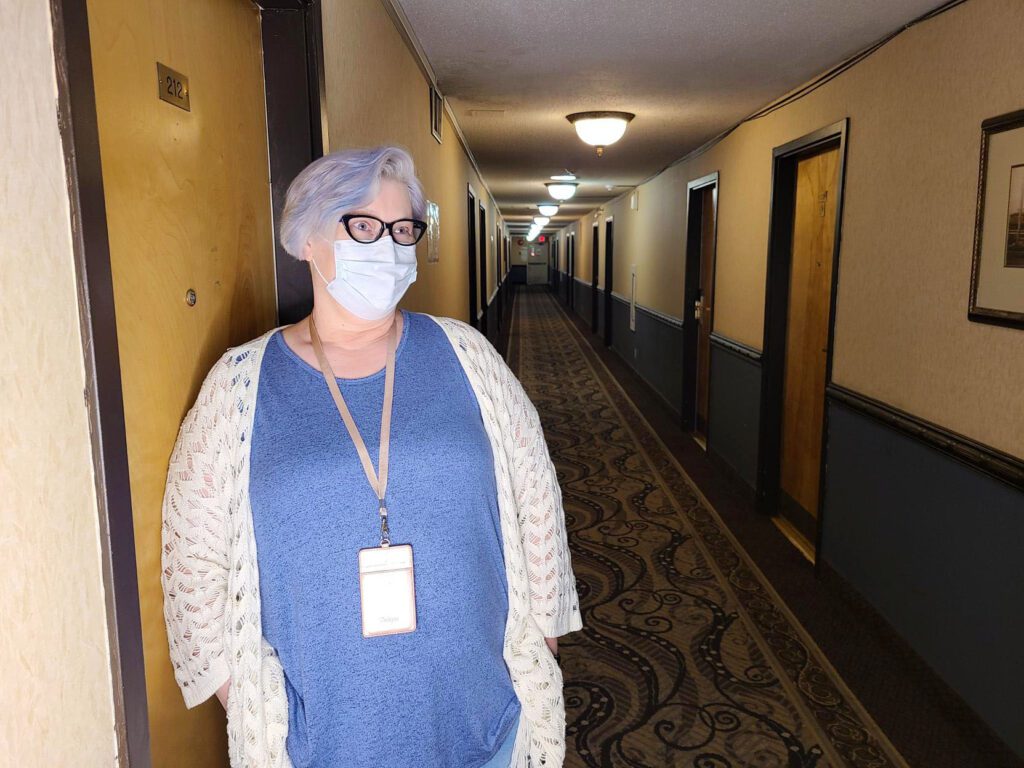 In June of 2020, Sandra Glass had three weeks to rapidly open an Emergency Response Centre out of a Coquitlam motel to support those experiencing homelessness during the COVID-19 pandemic.
In June of 2020, Sandra Glass had three weeks to rapidly open an Emergency Response Centre out of a Coquitlam motel to support those experiencing homelessness during the COVID-19 pandemic.
“The demographic we serve often has nowhere else to go,” Sandra explained, noting that priority is given to those experiencing homelessness who are 55 and older, or who have an underlying health condition that puts them at greater risk of dying or having an adverse reaction to COVID.
The 28-bed program houses roughly 35 residents at a time, the majority of whom have substance use challenges. Most have mental health diagnoses, and nearly half have concurrent disorders. To support clients, staff provide three meals daily, harm reduction services as well as medical support.
“Many who come here have nobody and haven’t had somebody invest in them, or show care for them as human beings in a long time. People who are trying to get out of addiction, who have become homeless, have a lot of shame.”
More than 75 individuals experiencing homelessness utilized the shelter in the first six months of operation. And the program has seen people move forward: Five individuals entered market housing utilizing program resources in the first six months of operations, and two clients have moved into treatment programs within Phoenix Society. Twelve more were deemed ‘housing ready,’ meaning they are actively seeking rental housing.
“We’ve had more success in discharging folks to treatment facilities than we have to housing simply because of the lack of available housing. And most of our residents are on Income Assistance or disability, and the rental portion of what they receive isn’t even close to what it costs to rent.”
Barriers to housing include lack of affordability even with a rental subsidy, low vacancy rates, difficulty getting out of province or out of country birth certificates to obtain BCID, and lack of wheelchair accessible units.
Sandra says onsite services continue to be critical for success in improving clients’ physical, mental, emotional, social, and spiritual health as they shift from high levels of drug use to more stable levels. The resulting improvement in cognitive functioning and social interaction allows the program to effectively connect clients to housing, health supports, advocacy services and other agencies as required. Support from the outreach workers provided by Phoenix Society through Reaching Home funding have also been key to helping clients overcome lack of ID, lack of health care, and inability to access counselling.
Sandra said she’s been blessed to bear witness to many stories of resilience at the Emergency Response Centre; both in her staff and in the clients they serve.
“The team as a whole has been really resilient,” she said. “One of my favourite client stories was a man who’d been a heroin user for 50 years. When he came to us he weighed about 90 pounds, he was in his 60s and had no interest in getting off drugs.”
Over time he stabilized, put on weight, and was introduced to the idea of treatment. He came back to the motel after being initially overwhelmed in treatment at Phoenix Society but with support, he returned.
“I love my job. I love coming to work. I love working with a really diverse team of staff,” Sandra said. “And working with clients who have such unique individual stories. It makes it frustrating when you encounter stigma around homelessness.”
“There isn’t one story that fits all of these people,” she added. “We have a number of older clients who are in addiction due to suffering a serious injury and being prescribed narcotics and then those were cut off and they were still in pain. And not everybody who stays here has addiction issues.”
“We have an older fellow who lost his housing due to hospitalization and is slightly too young to get his Old Age Pension and his disability doesn’t give him nearly enough to get into the rental market.”
“At the end of the day, this is a temporary program. We just want to help them end up somewhere better.”
